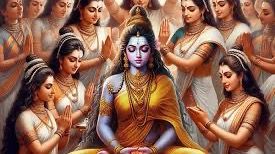Teej festivals, celebrated across India, are vibrant occasions marked by fasting, rituals and joyous traditions. Among the various Teej festivals celebrated in states like Uttar Pradesh, Rajasthan, Biharand Madhya PradeshKajari Teej is noted for its unique customs and significance.
Kajari Teej, also known as Badi Teej, Kajalia Teej or Satudi Teej, is particularly significant for married women. Scheduled to fall on August 22, 2024, Kajari Teej is celebrated with great devotion, in line with the auspicious Tritiya Tithi from 5:06 pm on August 21 to 1:46 pm on August 22. The festival is a heartfelt celebration of marital bliss and family prosperity.
Points of difference with other Teej festivals
Unlike other Teej festivals, Kajari Teej focuses on the well-being of the spouses and the prosperity of the family. The origins of Kajari Teej are rooted in the mythological love story of Goddess Parvati and Lord Shiva. According to Hindu tradition, Goddess Parvati performed rigorous penances to win the affection of Lord Shiva, a testament to lasting love and commitment.
The festival celebration begins early, with women rising before dawn to begin their fast and prepare for the day’s rituals. Houses are decorated with colourful rangolis, flowers and lights, creating a festive atmosphere. Traditional attire adds to the splendor of the day, as women dress in intricate regional garments.
Kajari Teej rituals
A central element of Kajari Teej is the ritual of building a pond of clay and cow dung in front of the houses, filled with raw milk and water. A lamp is placed on the edge of the pond and offerings are made to Neemdi Mata. Women, both married and unmarried, perform special prayers and offerings, including fruits, sweets and flowers, to seek blessings for their husbands and future spouses.
This distinctive celebration of Teej combines deep spirituality and cultural practices, making Kajari Teej a unique and cherished festival in the diverse tradition of India.
Disclaimer:
The information contained in this post is for general information purposes only. We make no representations or warranties of any kind, express or implied, about the completeness, accuracy, reliability, suitability or availability with respect to the website or the information, products, services, or related graphics contained on the post for any purpose.
We respect the intellectual property rights of content creators. If you are the owner of any material featured on our website and have concerns about its use, please contact us. We are committed to addressing any copyright issues promptly and will remove any material within 2 days of receiving a request from the rightful owner.

